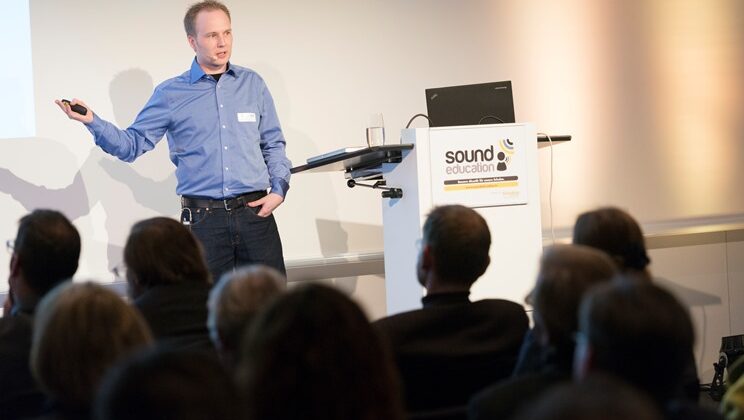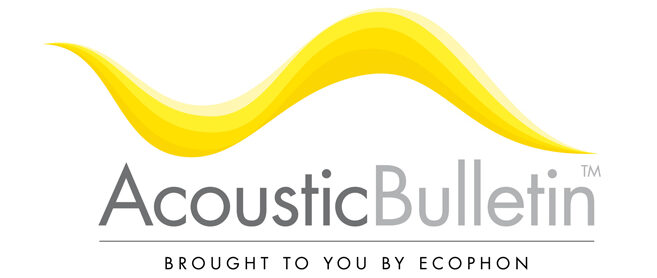
It’s time to meet another Acoustic Bulletin Editor, and this time we go to Germany and have a chat with Holger Brokmann. Holger has a Diploma in Educational Science and a passion for music and guitars. He loves playing them, even building them and modifying the ones he buys. In fact, when asked how many guitars he owns, he answers: “Too many. Let’s just say over 10.”
You’re a Concept Developer Educational Environments, what does that mean?
Good question! It’s a very dynamic job, always changing over time which is something I really enjoy.
In terms of what I do it’s about spreading the message of room acoustics mostly in educational settings and raising awareness of the research in the field. I am basically trying to raise the understanding of the importance of the topic. It’s an interdisciplinary world; a mixture of architecture, physics and education; I get to hang out with, and learn from, lots of interesting people!
Also, it’s a good thing you’re working for; trying to positively change and influence the acoustic environment of people, and that’s a really nice feeling.
What’s your background?
I have a diploma in Educational Science and stumbled across the job almost by accident. Ecophon was looking for someone to work in the educational segment after I graduated from University. This sounded like an interesting job since one of my main hobbies is making music. It was a happy combination of my interest and education all baked into one job!
Give us some examples of work you’ve been doing recently:
I’ve been researching different types of learning environments because this is one of the most important parts of the future of learning. I’ve looked at sound propagation through sound mapping in two open and semi-open plan schools, Witzenhausen and De Werkplaats in the Netherlands. Sound propagation is so crucial for open spaces. The next step is to look a little further into this; the effect of changing the design and how people work and learn in these environments.
Another part of my job right now is to spread the message of what standards (the revision of DIN18041:2016-03) need to be fulfilled. For example; Germany is implementing the UN’s convention around the right of inclusion (editor’s note: Convention on the Rights of Persons with Disabilities).
People forget about hearing impairment and only think of people in wheelchairs. Acoustics is a big part of inclusion.
Germany is quite big, so I train mostly architects, building authorities or even special teachers for hearing impaired students in the importance of good room acoustics.
Are you speaking at any events this year?
I won’t be presenting but I will be present at DAGA later this month (editor’s note: 19-22 March). A student will be presenting a study that was being done at our German office where different acousticians where measuring a mock-up scenario to see the differences in the results. I’m looking forward to discussing that with colleagues and getting feedback.
Can you describe the local acoustic standards? How do they compare to other countries?
The main standard is the DIN 18041:2016-03 and there is a good deal of awareness around. The latest revision was mainly done in 2016 as a response to the new laws around inclusion which is a must-have for nearly all newly built schools and public buildings and refurbishments. It’s the law and it must be fulfilled, so the acoustics become a must-have.
Some parts of the standard are slightly stricter compared to other European countries, like the Netherlands. Interestingly, several other countries are using the German standard or adapting it to their needs.
What is the German market like?
Overall, the acoustic awareness has increased, also in the building industry, these ten years I’ve been with Ecophon. But there’s still a long way to go. There is progress but it takes time. Adding, for example, new acoustical descriptors to the standard is therefore difficult.
The school buildings and pedagogy are mostly very traditional and it’s changing very slowly. Architects are looking at different designs, more functional buildings and design so I think we’ll see more of that in the coming years.
Can you recommend any acoustics-related resources?
For German speakers, I would recommend Forum für Mikrofonaufnahmetechnik und Tonstudiotechnik, which looks kinda old-fashioned but it is a good resource for all the basics around acoustics. It was set up as part of the works of Dipl.Ing. Sengpiel.
So, before we conclude, what’s up with your fascination with guitars?
As a kid, I liked listening to music and when I was 14-15 years old some friends were playing in bands and I was able to test some instruments. Playing the guitar was really fun and it got me hooked. So I started playing in some bands and buying guitars, amps and starting to modify all the equipment. It’s a nice hobby since it combines, music, woodworking and electronics. It never gets boring.

